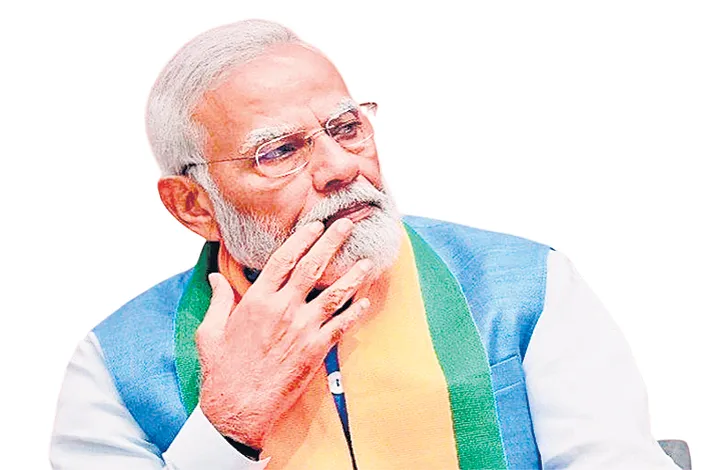Making a Mockery of Democracy
27-08-2025 12:00:00 AM

Venkat Parsa I new delhi
Prime Minister of India was brought under the ambit of Lok Pal and Lok Ayukta Act to probe corruption charges against Prime Minister, Union Ministers and MPs. The Congress enacted this landmark legislation. It was passed in the Rajya Sabha on December 17, 2013, and in the Lok Sabha on December 18, 2013. Following Presidential assent on January 1, 2014, it came into force on January 16, 2014.
If making Prime Minister accountable is the avowed purpose, Lok Pal Act could have been brought into force. But, an existing Act has been shelved for 11 years now, for obvious reasons, as allegations relating to PM Cares Fund, Electoral Bonds, Rafale deal, et al, would have come under the purview of the Lok Pal. To cap it, Constitution 130th Amendment Bill was introduced in Lok Sabha on August 20, probably to trigger fresh campaign, more as a diversionary tactic.
Bill to remove Prime Minister introduced in Parliament -- is a clever ploy at headlines grabbing. Target is elsewhere, while the focus is misleadingly somewhere else. On the BJP radar are Karnataka Chief Minister Siddaramaiah, Telangana Chief Minister A Revanth Reddy and Tamil Nadu Chief Minister M K Stalin. Any pending case can be raked-up to force the issue.
Giving Away Game plan
Provision of 30 days in jail for removal of Prime Minister or Union Minister or Chief Minister, in itself, is a formulation that gives away the game plan. Invoking provisions under Unlawful Activities (Prevention) Act (UAPA), or under the Prevention of Money-Laundering Act (PMLA) in the chargesheet is enough to deny bail for at least six months to a Chief Minister.
This clears the way for change of Government in the State, without elections, just in 30 days. It's automatically done, with no need for issuing any order, effecting change of Government.
Significantly, this will result in regime change. If ever Prime Minister is removed on the 31st day of his detention, as envisaged in Constitution 130 Amendment Bill, it's not just the Prime Minister, but the entire Government goes. This is stretching human credulity to its utmost limits. What is really aimed at through such means is forcible regime change in the States, targeting the Opposition Governments. This erodes and undermines democracy in the country.
FIR, Not Conviction
Prime Minister was included in the Bill with eye to sensationalize it. What else explains inclusion of Prime Minister in such a frivolous Bill? On the face of it, Prime Minister of India cannot be removed on the basis of an FIR, without as much as an investigation, not to speak of fair trial and conviction in a court of law. This would be Jungle Raj, at its worst.
Removal of the highest executive, both at the Centre and in the States, through frivolous means, makes a mockery of the parliamentary system of democracy. What is worse is that this is done on the basis of allegations, even before these are investigated, fair trial is conducted and not to speak of conviction in a court of law.
Following jailing of two incumbent State Chief Ministers, the then Delhi Chief Minister Arvind Kejriwal and Jharkhand Chief Minister Hemant Soren, the Constitution 130th Amendment Bill is ominous. The then Delhi Deputy Chief Minister Manish Sisodia and the then Delhi Minister Satyender Jain were also jailed. This Constitution Amendment Bill seems to be more a stratagem to dislodge Opposition-ruled State Chief Ministers.
Non-Parliamentary Means
For a very long time now, focus has been on removing Prime Minister and Chief Minister through non-parliamentary means. The entire Anna Hazare Agitation on Lok Pal was orchestrated by the BJP-AAP combine under the banner of India Against Corruption, with eye on wrecking parliamentary democracy by bringing focus on removal of Prime Minister through non-parliamentary means. The Congress did enact the Lok Pal but the BJP, which carried out crusade for it, has shelved it. Now, yet another campaign is being orchestrated around Constitution 130th Amendment Bill, with focus again on removing Prime Minister and Chief Minister through non-parliamentary means.
This is a disturbing trend. It has the potential to wreck the system of parliamentary democracy that was painstakingly built over decades in the country. Earlier, it was Lok Pal Agitation, with similar objective. Now, it is the Constitution 130 Amendment Bill that seems to aim at carrying forward this mission of the Modi Government.
Frankly speaking, it's highly doubtful whether any police station in the country will ever register FIR against the Prime Minister, not to speak of arresting and keeping him behind bars for 30 days.
Parliamentary Procedure
Pandit Jawaharlal Nehru opted for British Westminster model of parliamentary democracy. It envisages that the Prime Minister at the Centre and the Chief Minister in the State, stay in office as long as they enjoy the confidence of the House.
To remove them, passing No-Confidence Motion during Monsoon or Winter Sessions and during Budget Session, defeating the Finance Bill, or any Money Bill, on floor of the House, is the legitimate way to dislodge the Prime Minister at the Centre and the Chief Minister in the States.
The Constitution 130th Amendment Bill, since referred to Joint Parliamentary Committee, seeks to remove Prime Minister or Union Minister at the Centre and Chief Minister or Minister in the State. Automatically, they cease to be in office on 31st of their detention, if bail is not obtained. To achieve this, it seeks to amend Articles 75 (for Union Minister), 164 (for State Chief Minister or Minister) and 239AA (for Union Territory) of the Constitution.
Principle of Jurisprudence
Innocent, till proven guilty, is the cornerstone of jurisprudence. This is sought to be made to stand on its head by the Constitution 130th Amendment Bill. Burden of proof vests squarely with the prosecution and such proof has to be beyond reasonable doubt. Presumption of innocence cannot be negated through such a piece of legislation.
Prolonged detention periods being given legal sanction through draconian laws militates against the principles of natural justice. If detention before trial is intended to be a form of punishment, it blurs the line between presumed innocence and the treatment as a potential criminal. Now, focus is on prolonging period of detention under dreaded laws like UAPA and PMLA. Invoking these laws, detention period can be prolonged, making it the basis for removal from office. Such shortsighted strategies can irreparably hurt and damage the very foundation of parliamentary democracy in the country.








